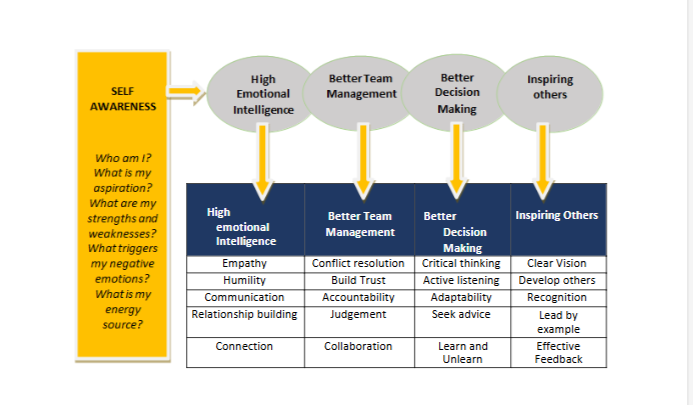Have you ever heard of the Japanese concept of “three faces”? Accordingly, each person has a different persona: one shown to the world, another to close friends and family, and a third, secret one, never revealed to anyone. I describe the third face as the most important and critical one. The hidden but the real face. It may be the brightest one, or it may be the darkest soul or it may just be a striking balance between the right and wrong. This face actually defines our persona, our real self when adversity hits us. The questions that bother me are:
Do we really know our third face or do we just have a deceptive self-perception?
Have we truly reflected on our true self?
Do we have a higher self-perception and a low self-awareness?
A series of surveys by organizational psychologist Tasha Eurich suggest that although 95% of people think they are self aware, only 10%-15% actually are. Research indicates that only about 15% of people are sufficiently self-aware and that there is less than a 30% correlation between people’s actual and self-perceived competence. That same research shows that a leader’s lack of self-awareness negatively impacts decision making, collaboration, and conflict management.
What is Self Awareness?
Research defines it as ‘the ability to understand our own thoughts, feelings, motivations, and behaviours, as well as how they affect others’. This requires us to determine our strengths and our weakness. The latter being the toughest as mostly people perceive themselves the victims.
Why is it important?
Self-awareness gives an inexplicable power and control. It helps us in leading a situation in an effective manner. It also facilitates building resilient relationships and a better world. While I was attending the women emerging program I leaned how knowing myself better through my essence and elements, I can control my behaviour through my expressions and energy. This gives an immense power when leading a situation, circumstance, department, company and the list goes on.
Often people ignore the power of self-awareness. They consider it as a leadership trait only and for those who are in a leading role. Remember that we all are in leading roles all the time as we lead every single minute of our life. From what we eat and wear today, from how we spend our day, from where shall be buy groceries, from what we cook today, from what to do with our time and the list goes on are a few of the little examples of the decisions we are taking and the minutes we are leading. This is shaping our connection with the world and with people in it. All this needs a thorough knowledge of thyself.
How do we develop self-awareness?
Self-awareness require courage to dive deep into the dark sides of one’s real self. Most of us are not truly aware what wrong are they doing. It’s imperative that we get ourselves evaluated through our peers, family, friends on our strengths and areas of improvement, while evaluating what is our view on the same. This should focus on our values, aspirations, feelings towards the world.
- Be ready to accept the feedback.
- Listen to motivational talks and inspirational talks to let your unconscious mind let you reflect on your true self.
- Visit hospitals, social service centres and evaluate the hardships others are enduring enabling one to get oneself out of the self-pity mode.
- Take out a few minutes for yourself to reflect what could have been done better today? how your behaviour impacted others? Pay attention to others feelings.
- Reflection. One of the key takeaways from Women Emerging expedition was reflecting on ourselves. Ask yourself the questions such as what are my areas of improvement? what made me upset today? what is my motivation? Does my motivation impact anyone around me negatively? What I did to benefit others today? What helped me today in a difficult situation? Who helped me? Such questions help to evaluate oneself on daily basis and access the focal points.
Self-Awareness is not something that can be done at once. It needs patience, perseverance and humbleness. Consistently focus and evaluate yourself just like you evaluate others.
What is the role of Self-awareness in Leadership?
Based on my learnings, I have devised the attached model to reflect the role of self-awareness in leadership.


Self-awareness is a journey, as we evolve and as we move through the life. We meet people, we experience life, we live times and as we grow up we change as a person as well. Our life journeys shape us the way we are. Hence, self-awareness shall not be tick in the box, rather it should be assessed every day or periodically to help us understand ourselves better. And then to contribute to the community at large and to the mother earth.
About the Author:
Ayesha Afzal is a Management professional, working in a leadership position in Pakistan. She is fond of painting and writing. She has recently completed the Women Emerging (WE) Expedition Pakistan Chapter and now proudly a WE Fellow.





